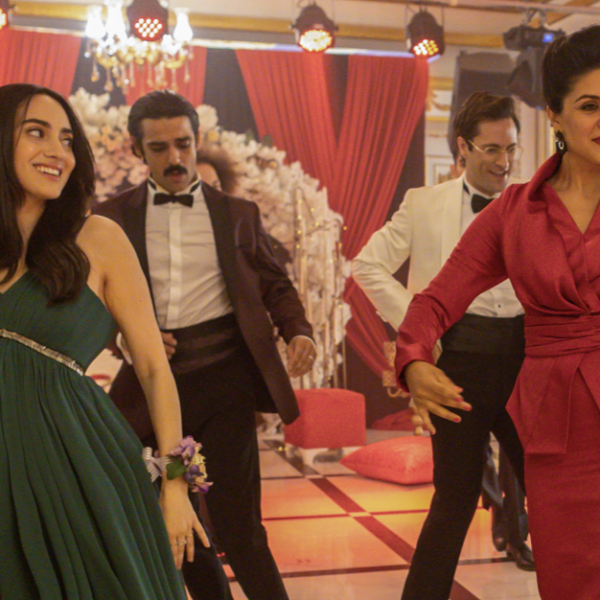“The Life of Chuck” is a departure for Mike Flanagan, in the sense that it’s not technically a horror movie. But it is a Stephen King adaptation, which is very much in the “Doctor Sleep” director’s wheelhouse. And it is haunted: By regret, by memories, and by the snuffing out of an entire internal universe when someone dies. (Adding another layer of sorrowful real-life resonance, film journalist Scott Wampler, who died suddenly in May, appears as a background actor in the film, which is dedicated to him.) If anything, “The Life of Chuck” just peels back the layer of metaphor and gets straight to the wistfulness that underpins all ghost stories.
Structured around a verse from Walt Whitman’s “Song of Myself” — “Do I contradict myself? Very well then, I contradict myself. I am large, I contain multitudes” — “The Life of Chuck” is told in reverse order from the end of a man’s life to the beginning. It does so in a way that’s surprising enough that it’s best not to discuss it in too much detail; suffice to say that it takes a cosmic approach to the idea of inner worlds. (“Every man and every woman is a star,” to quote Whitman’s fellow literary eccentric Aleister Crowley.) The entire movie isn’t sad, although it does land on a note of genuine pathos. But sentimentality suits Flanagan, whose florid writing style is well matched by the high-concept ideas explored here.
Nick Offerman narrates the opening of each of the film’s three chapters, each of which related in some way to, well, the life of accountant (and surprisingly good dancer) Charles “Chuck” Krantz, played by Tom Hiddleston as an adult and Jacob Tremblay as a boy. Flanagan regulars Rahul Kohli and Kate Siegel show up in minor parts, part of a who’s who of familiar genre faces like David Dastmalchian, Matthew Lillard, and Harvey Guillén that rounds out the ensemble cast. Chiwetel Ejiofor and Karen Gillan play slightly bigger roles as a divorced couple who turn to each other for comfort in the imminent apocalypse — to explain more would, again, undermine the film’s most poetic theme — as does Mark Hamill as Albie, Chuck’s New York-accented Jewish accountant grandfather.
It’s Zeyde Albie who convinces young Chuck that numbers are just as exciting as moonwalking across the school gym, setting him on a stable, but unexciting life path. “The Life of Chuck” uses dancing as a shorthand for whimsy, creativity, playfulness, joy — name an unselfconscious emotion that we’re supposed to put aside in the name of adult responsibility, and it’s expressed through dancing in this movie. Bubbe Sarah (Mia Sara) shows young Chuck musicals to cheer him up after his parents die in a car accident — this dark turn comes on that quickly and brutally in the movie, too — and his fondest memories are of dancing with her in her kitchen as diffuse white light streams in through the window.
It’s a nice scene, but also a mawkish one. To be fair, Flanagan makes no effort to disguise or apologize for the clichés in “The Life of Chuck,” whose centerpiece scene depicts Chuck rediscovering the magic in his otherwise routine life by dancing with a stranger in the center of a suburban mall promenade as a crowd gathers around them. From there, the movie takes a turn into sadder territory, but the tone remains sunny and sweet and pleasantly generic. The lighting is bright, the locations are quaint, and the quips all come with a pre-packaged air of warmth and wisdom.
Again, many of the points being made here are of a generic “enjoy every sandwich” type of bent. But there is something touching about “Chuck’s” core premise, which is that even the smallest and most ordinary of lives is animated by a divine spark. A human being is the culmination of every place they’ve ever been, every thing they’ve ever done, and every person they’ve ever met, and each of us carries a galaxy of experiences around with us everywhere we go. And when we die, those worlds die with us.
Despite his reputation as a master of horror, this side of Mike Flanagan has always been there. (Same for King — he did write “The Green Mile,” after all.) As a filmmaker, Flanagan deals in raw, go-for-broke emotion; it’s just that this time around, he’s using that passion to affirm the audience, not disturb them. Whether one finds this uplifting or eye-rolling is a matter of taste, and cynics will likely find Flanagan’s latest far too saccharine for theirs. Viewers with a sweet tooth, meanwhile, may find themselves thoroughly charmed by “Chuck’s” dorky earnestness.
Grade: B-
“The Life of Chuck” premiered at the Toronto International Film Festival.





